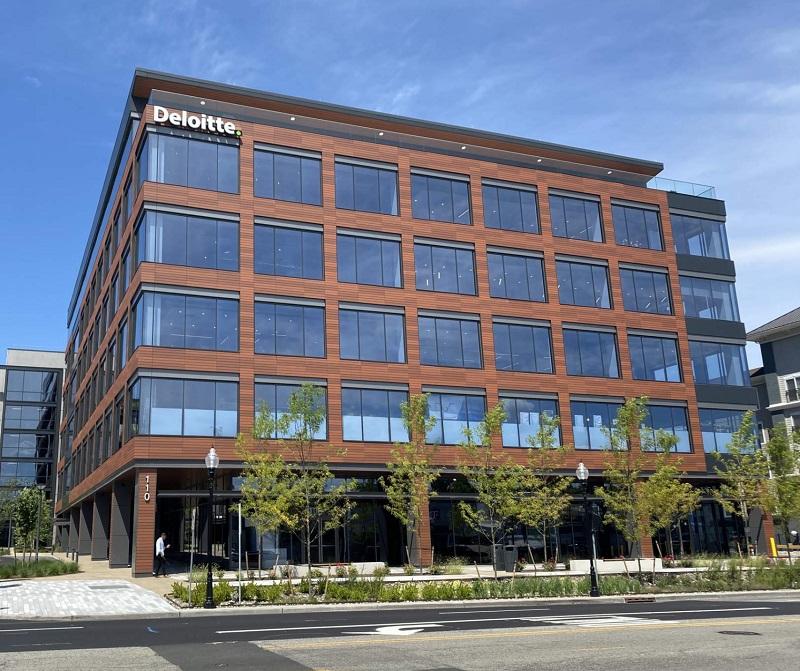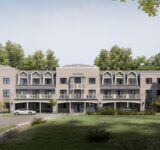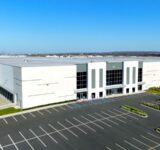Deloitte LLP has moved into its highly anticipated new office space at M Station East in Morristown, where it occupies 110,000 square feet under a lease with SJP Properties and Scotto Properties. Office market experts say more large, high-profile office deals are likely to follow, despite the push for hybrid schedules and lingering questions about the return to work. — Courtesy: SJP Properties
By Joshua Burd
Deloitte LLP has moved into its highly anticipated, gleaming new office space in downtown Morristown, where it occupies 110,000 square feet under a lease that predates the pandemic.
For SJP Properties, which developed the building known as M Station East, the finished product has been “a huge asset” as it markets a second ground-up structure that is slated for the property, having toured Deloitte’s space with several prospective tenants.

“The fact that the east building is now up and occupied has been a total game-changer,” said Alex Erdos, SJP’s senior vice president of leasing and marketing. The developer has seen a significant uptick at the Morris Street project in recent months, drawing the interest of several full-building, high-caliber users, he said, “so we’re pleased with the activity level and confident that we’re going to get somebody who is the right fit there. And it will be somebody that’s accretive to the entire project and a good neighbor to Deloitte.”
Those tenants are out there, at least according to Erdos and other key players in New Jersey’s office market. Despite the push for hybrid or all-remote work schedules — and lingering questions about how and when to lure employees back to an in-person setting — experts say the large, high-profile office deal is alive and well in the pandemic’s aftermath.
That’s evident by several outsized leases in New Jersey this year, starting in late spring and continuing through the summer, and others that are likely still to come, as blue-chip employers make major investments in their physical footprint, often involving relocation and new construction.
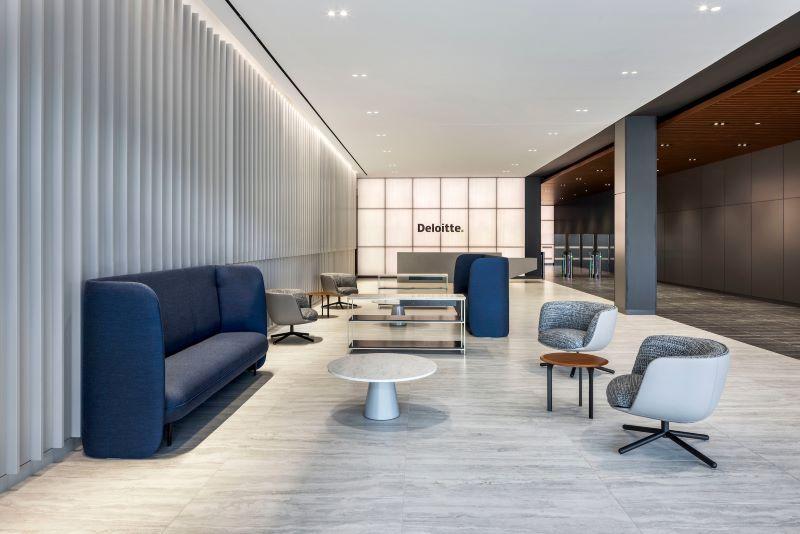
“It does feel to me that the bigger tenants seem to be putting a stake in the ground,” said Tim Greiner, an executive managing director with JLL and the firm’s lead office broker in New Jersey. “How they’re designing their space is all over the map, but they seem to be willing to commit to space and make the capital commitment.”
According to Greiner, those employers hope that investing in a vibrant, buzzworthy office space will entice employees to return “and not feel like they’re forced to come back.”

“That’s the dialogue we’re having with a lot of companies: If the executive culture and your work type says that you need to collaborate with your colleagues at least three days a week, and you’re going to make a lease investment, do it in something that will really get those employees excited about coming back to work.”
Deloitte’s commitment to Morristown came before the COVID-19 crisis took hold in the U.S., with a formal announcement coming in January 2020. But the firm stayed on course as SJP and partner Scotto Properties forged ahead with construction, paving the way for Deloitte employees to move into M Station East this past July.
Along the way, several other companies have inked leases for high-profile locations in northern and central New Jersey. The largest among them was PTC Therapeutics, which took more than 360,000 square feet for a new headquarters, collaboration and research hub at Warren Corporate Center, under a deal announced in June with Vision Real Estate Partners and Rubenstein Partners. Meantime, banking giant Morgan Stanley committed to nearly 120,000 square feet at Onyx Equities’ newly renovated campus at 340 Mount Kemble Ave. in Morris Township, as did Cellares Corp., a biotechnology firm, at 95 Corporate Drive in Bridgewater.
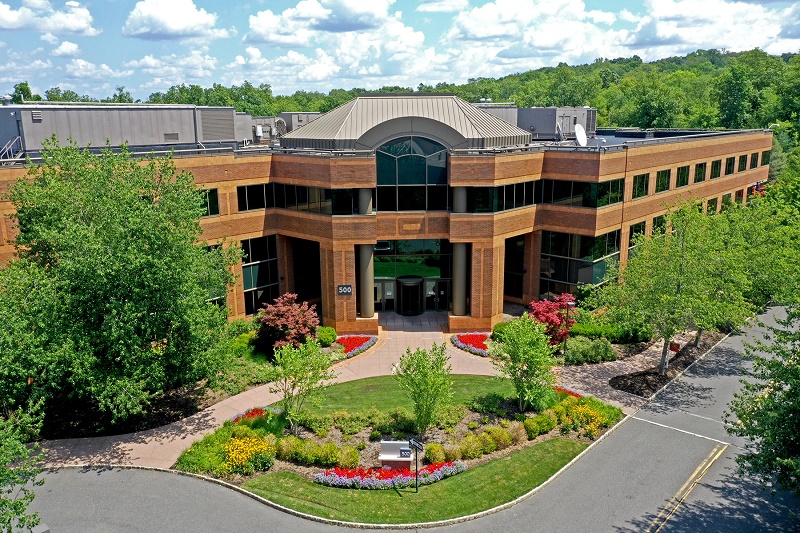
Additional tenants are on the hunt. According to Steve Jenco, JLL’s director of New Jersey office research, three sectors — life sciences, tech and information and banking and financial services — each accounted for about 20 percent of the requirements in the market as of late August. Some of those needs exceeded 50,000 and 100,000 square feet, he said.
Jenco described the demand as more of a “slow turn of the faucet,” rather than a sudden flood of requirements, but said it comes after a series of false starts by tenants about how to reopen their office and move ahead with a new lease. Long-term plans come with “a tremendous investment,” but the past two years have been rife with concerns about new COVID variants, managing hybrid schedules and how much space they would even need.

“We were in that period of the unknown, where you saw tenants that were previously in the market looking for space that simply put the brakes on things and said, ‘You know what, we’re going to hold off and see where things play out,’” Jenco said. “It seems that there is more momentum in the market now that companies are feeling a little more positive that we’re ready to make some decisions here, just based on what we’ve experienced the past couple of years.”
What’s more, employees are now truly feeling the effects of two years of work from home or work from anywhere, according to Kimberly Smith, JLL’s vice president of workplace strategy, who noted that companies are “losing a sense of culture.” That has caused feelings of isolation among remote workers and helped fuel what’s been known as the Great Resignation, she said, prompting employers to rethink their workplaces.
She pointed to a key question that JLL asks in its workplace research: “Is your office commute-worthy?”
“People are starting to think about that in terms of the big picture of, fundamentally, what is the purpose of the office?” Smith said. “And, really, it’s the cultural center to connect employees and drive the mission of the organization. So that’s really what’s happening in terms of why people are investing and creating a workplace, because they do find value in bringing people together.”
Employers to date have been more lenient about mandating time in the office, she added, but many are now projecting that September is “when they’re going to start to enforce a stronger hybrid program that requires employees to be in the office a certain number of days.” That’s prompted them to go above and beyond with respect to incentives for their workforce, such as free meals and improved office catering, elevated health and wellness amenities and free or subsidized transportation options. Those are among the findings of a recent JLL survey of 240 senior HR professionals, which also highlighted perks such as quality of the office space and access to flexible work facilities, such as co-working areas.
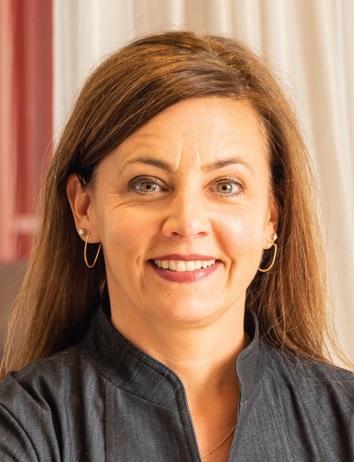
“This ritual of … getting up and going to wherever your home office is needs to be disrupted right now, because it’s been two-plus years,” Smith said. “So, if we can find meaningful ways of bringing people together and modifying our offices in order to do so, that’s the inspiration.”
In other words, corporate tenants may be scaling back in many cases, but they’ll still need significant footprints as they invest in new spaces and new ways for their employees to engage with the space. Smith also pointed to a shift in office planning ratios from before the pandemic, which designated around 75 percent of the space for individual users, with the balance going to common areas and amenity space. Post-pandemic, that’s now trending toward a 50-50 split and “sometimes even heavier on collaboration and group spaces.”
That likely made 340 Mount Kemble Ave. in Morris Township all the more attractive to Morgan Stanley, which took 116,578 square feet under its lease with Onyx Equities. The deal followed Onyx’s $50 million gut renovation and modernization of the former AT&T campus near Route 202 and Interstate 287, which included a new 25,000-square-foot amenity wing with a commercial-grade fitness center, a full-service cafeteria, a conference center and game and social lounges, along with a new glass curtain wall façade, window and roof replacements and a sweeping new site and landscape plan.
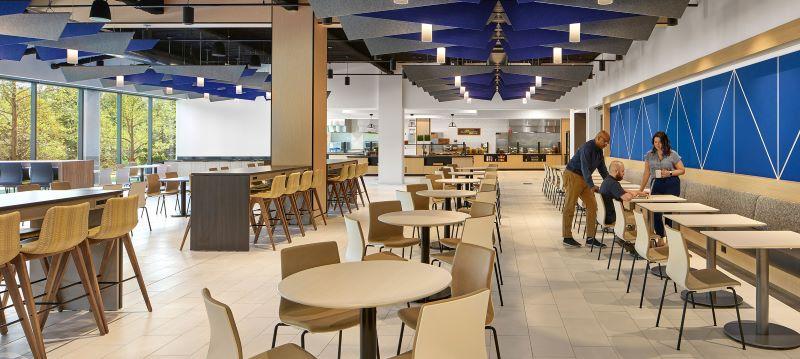
Deloitte also had such an opportunity the Gensler-designed M Station, which offered the chance to be in Morristown’s vibrant, housing- and amenity-rich downtown, but also a blank canvas to plan its space.
“Everything is trending toward a reimagining of the way these spaces are utilized, so in a lot of ways, these existing workplaces are playing catch-up and figuring out how to reconfigure to adapt to these new conditions,” SJP’s Erdos said. “And with a situation like Deloitte, it’s really unique because they were able to custom-tailor this opportunity to exactly what they were looking to use it for.”

